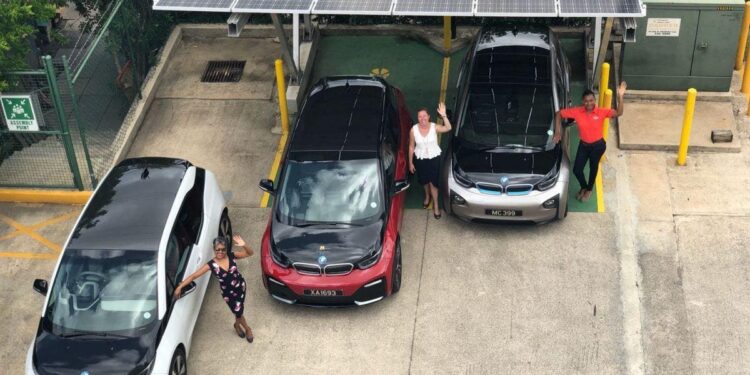The Caribbean island of Barbados is now one of the world’s top users of electric vehicles. Much the this is down to local entrepreneur Jo Edghill and her husband Simon Richards, the co-founders of Megapower. This Barbadian company has been pioneering electric vehicles (EVs) throughout the Caribbean region since 2013, after Jo returned from living abroad in Australia, China, England and Papua New Guinea to launch the company.
Megapower is not a traditional garage, offering a range of renewable energy services to complement its electric vehicles. The team focuses on bringing EV, charging infrastructure and solar energy to the Caribbean, working across the region from Trinidad to The Bahamas and with customers including governments, electric utilities and the private sector. Leading by example, the company’s own offices were taken entirely off-grid this year, and Jo parks her own electric vehicle (a BMW i3) under a modular solar carport designed by her team.
Megapower Ltd.
James Ellsmoor: Congratulations on your successes so far! Can you start by telling us what inspired you to launch Megapower? Why do EVs make sense particularly for islands like Barbados?
Jo Edghill: Barbados is heavily dependent on imported fossil fuels to generate over 96% of our electricity. This puts our island in an unsustainable situation and fluctuations in global oil prices can heavily impact our economy. It also makes sense to reduce this reliance from a cost-saving and environmental preservation perspective.
I spent some time living and working in Papua New Guinea, which is a country abundantly rich in natural resources. When I returned to Barbados, it really struck me that here we have our own natural, renewable resource, the sun, that is being underutilized! We have at least 220 days of pure sunlight every year, so why not take advantage? Recognizing that Barbados, with our relatively short driving distances and abundant sunshine, is an ideal location to operate electric cars, with free fuel from the sun, we decided to launch Megapower.
James Ellsmoor: Why do you think electric vehicles have been slow to take off? Is this changing?
Jo Edghill: With almost 350 electric vehicles on the road, Barbadian consumers have shown their support for zero-emission driving. EV charging infrastructure has been key to this. In Barbados, you are never more than 5km from one of Megapower’s public EV charging points. EV drivers on small islands, like Barbados, will never have the range challenges of those in larger countries.
I think we are well on our way to overcoming any challenges for uptake in Barbados but early uptake was hindered by high costs, uncertain regulatory/policy environment, limited availability of EVs and what I like to call “new technology phobia”. Moving into 2019 my outlook is very bullish – we have a supportive Government and several businesses across different sectors have swapped their fleets to EVs and are quickly recognizing the benefits.
Megapower provided one of Barbados’ leading telecommunications firms, Flow, with a fleet of eight… [+] fully electric vehicles.
JO EDGHILL
We have designed a modular solar carport system which we have also exported to other islands in the region. Our largest solar carport is in Barbados, covering 56 parking bays and powering a large office complex. Solar carports provide shaded parking as well as a visual statement of renewable energy and are also suitable for locations where rooftop installations may not be possible.
What I am even more excited about is our pioneering new battery re-use lab. This will enable us to repurpose electric vehicle batteries beyond their useful life in EVs for a number of applications and storage for renewable energy. We are implementing a grant from the Caribbean Export Development Agency to reuse EV batteries as storage for solar PV systems. We took our own office off-grid this year by reusing batteries from a 5-year-old Nissan LEAF to create a 5kWh storage system supplied by a 15kWp solar carport. This charges our cars and runs 4 AC units, fridge, lights and our full office for the week! We will add reused batteries to our product listing in 2019: it is an opportunity to lower the cost of new batteries for our customer’s vehicles by buying back their old ones and maximizing their lifespan. We want to expand this to take in all old batteries and in the future could even help to recharge cruise ships while they visit the island.
James Ellsmoor: Tesla is the big brand in the industry and gets much of the publicity. Are you a fan of Elon Musk? Or do you prefer other brands?
Jo Edghill: Elon Musk has made EVs sexy and owning a Tesla is aspirational for many. I love his approach to continuous innovation and market disruption, not product settling. We have sold 2 Teslas in the region but our business would not survive based on Tesla alone. With high vehicle duty structures, people are better buying a house and I think the technology is over the top for our humid and salty conditions.
As a specialist EV garage, we sell a range of models including Mitsubishi and BMW, but the Nissan LEAF has been our most popular and this is reflected at the global level. The Nissan LEAF was redesigned this year, with a larger 40kW battery and more sporty look. Personally, the BMW i3 is my car of choice. I choose to drive it because it is small, fast and compact – but it can still fit my entire bicycle in the back! It also uses recycled materials and I really like the look.
James Ellsmoor: What is your favorite thing about Barbados? What would you like readers to know about your country?
Jo Edghill: Barbados has the sporting, arts and entertainment diversity of a large country with the benefit of good weather and island conveniences (short distances to drive!). Barbados is also well-connected with over 20 cities directly accessible, including St. John’s in Antigua where Megapower opened a second office in 2016. Since summer 2018 there have also been direct flights to Panama, making South America within easy reach for business and pleasure.
Getty
James Ellsmoor: There has been a big political change in Barbados this year with a new Prime Minister Mia Mottley that heavily supports renewables. How does politics impact your work? What measures is the new government putting into place to encourage electric vehicles?
Jo Edghill: Despite having “garage status” for 5 years, we have finally been recognized as a garage – this translates to being included in all transport sector discussions and I am seeing the shift in how both the Government and other vehicle dealers view Megapower. We are now a serious stakeholder in the transport sector.
These are very exciting times for us. Interest in electric vehicles is growing exponentially and we expect to have about 450 electric cars in Barbados by 2019. This island is an ideal size for using electric vehicles. I’d like to say that within five years, 10% of the island’s population will be driving electric vehicles. They carry enough charge to deal comfortably with average local distances traveled in a typical day and drivers can also top up during the day if needed. Even with Barbados’ relatively expensive electricity, charging is inexpensive compared to gas or diesel. Each full charge costs approximately BBD$15 (US$7.50) for 125km (78 miles) of driving, which is about 1/3 of the cost of running an internal combustion equivalent over the same distance. Of course, if you install your own solar panels then the savings are even greater!
Delivery companies in Barbados including DHL and UPS are embracing EVs and now saving around half of their fuel costs compared to using fossil fuels. DHL is recharging delivery vehicles with their own electricity generated from a solar photovoltaic system on their premises. In Barbados, we have an established regulatory framework and a feed-in tariff for solar PV, which is not the case in some other Caribbean islands. A local NGO, the Barbados Renewable Energy Association (BREA), is very active and progressive, providing opportunities for its members to network, influence regulators and shape the local renewable energy and energy efficiency sector.
Jo edghill
James Ellsmoor: What other markets do you think have potential for Megapower? Do you plan on expanding outside Barbados?
Jo Edghill: In addition to showcasing the many advantages of electric cars, Barbados is also an ideal proving ground for the rest of the Caribbean and other small island states for improving electricity supply sustainability, efficiency, stability and cost-effectiveness through renewable energy sources and intelligent grid technology.
Since 2016 we’ve had a permanent office and partner on the ground in Antigua. Megapower works on special projects, either delivered out of our office in Barbados or from Antigua and we are currently running projects in St. Lucia, St. Vincent, Turks and Caicos, Grand Bahama and Trinidad. We have also recently signed a contract with the Government of Antigua & Barbuda to supply two electric school buses.
James Ellsmoor: What would you recommend for readers wanting to learn more about Barbados? Can you suggest any books or films?
Jo Edghill: Barbados has a rich history and two historical pieces produced this year spring to mind. The first is the book Vaucluse, by Donna Every set in 1816. It explores the story of the struggle for freedom versus the fight against emancipation during a period of great turmoil in Barbados. The second is Alison Saunder’s film Panama Dreams set in the early 1900s, examining the great migration of West Indians to work on the construction of the Panama Canal. These are both important eras in our island’s history and it is important for visitors to understand that we are much more than the beaches you see in the magazine.
James Ellsmoor: Thank you for your time and sharing your expertise. I am excited to see what’s next for you and Megapower!
Source link : http://www.bing.com/news/apiclick.aspx?ref=FexRss&aid=&tid=6751453630194dceac8807f676e36237&url=https%3A%2F%2Fwww.forbes.com%2Fsites%2Fjamesellsmoor%2F2018%2F12%2F20%2Fthe-electric-vehicle-revolution-is-alive-in-barbados%2F&c=15671543066595647742&mkt=en-us
Author :
Publish date : 2018-12-20 05:45:00
Copyright for syndicated content belongs to the linked Source.








